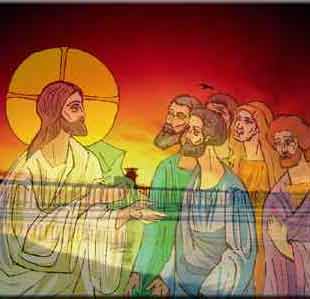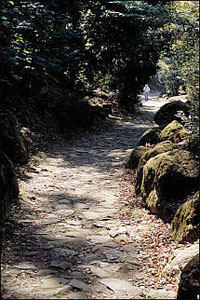|









|
|
- Who am I?
Mt 16, 13-21; "For you, who am I? Peter answered:
You are the Christ, the son of the living God"…"
Blessed are you Simon…" Then Jesus strongly recommended
to his disciples not to tell the people that he was the Messiah"

|
On his way and probably searching his own identity, Jesus
interrogated his disciples: "For you, who am I" "for
you" means that he was addressing to the group of disciples.
This has also the strength of a personal question, who ever we
are. |
-
- Just before, the disciples reported what the people were
saying: " for some, you are the Son of man or Johan the
Baptist, for others Elijah or one of the prophets" Easy
answers that do not cost much. When Jesus said: "for you"
Simon was the only one to answer. Were the others afraid to answer?
Were they not too sure what was the right answer? According to
the Gospel we cannot say that Simon was answering for the others
and that all agreed with him. Simply with conviction, he proclaimed
what seemed evident for him, at the time he was walking with
the Master;" you are the Christ (Messiah) the son of
the living God".
For Peter the expression "son of the living God" means
a man specially loved by God and close to him. Peter shared the
opinion of his people about the Messiah: a saviour, a liberator
who will liberate Israel from the Roman occupation. By following
Jesus Peter was seeing him as a man full of humanity, who restored
the blind and the lame, a prophet who was freeing the consciences
from the weight of the Law…
|
Jesus congratulated Peter for these words, so much better,
so much more true than what was said about him: "Happy are
you Simon" |

|
-
- Even imperfect or limited, to penetrate the mystery of
Jesus is a source of joy. This is not reserved to an elite or
to those specialized in religious studies, a simple fisherman
from Galilee can have access to this mystery, and so every body
who follows Jesus as his Master with a sincere desire to know
him.
Jesus added: "you did not find it by yourself, it is my
Father who revealed it to you" He made understood that the
true knowledge of him is still incomplete. In fact "since
that day, he began to show to his disciples that he will suffer,
be put to death and on the third day he will be resurrected…(Mt
16, 21) and Peter said: "God will not let it happen!"
We understand why Jesus severely ordered his disciples not to
tell to the people that he was the Messiah" That was so
inconceivable, so unthinkable for them and for the crowds.
-

|
It is only after the passion and the resurrection and at the
light and with the strength of the Holy Spirit that the disciples
were able to testify to this verity, a verity they experienced
with astonishment in painful circumstances. |
However far advanced in his faith a true witness of Jesus might
be, he is not going to trumpet without distinction his convictions.
Like Paul the Apostle, he knows that "our knowledge is limited
(1Co, 13,12). Peter himself invites us to be peaceful and respectful
when we are interrogated on our hope (1Pi 3, 15-16).
-
|
This does not prevent us to speak with conviction in relation
with how we live: this is what I can say today, that makes me
comfortable and happy but I don't pretend to deliver an answer
entirely satisfying. What I will discuss with you, perhaps will
help me to better understand my way of thinking. |

|
|
